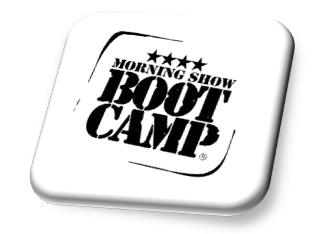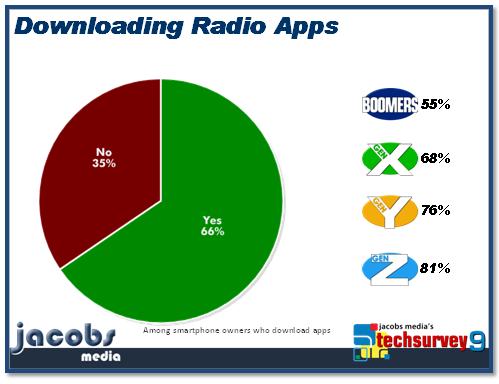If you’re in radio, you might want to send a gift basket (a nice bottle of wine will do) to your friends in Cupertino this month. They’re celebrating a big birthday.
That’s right – we’re talking Apple. Because first the iPhone, and then the App Store (celebrating its fifth birthday) may go down as the greatest things to happen to the radio broadcasting industry since the Walkman. And in fact, it is already looking like smartphones and apps will surpass the impact of personal radios in the minds and hearts of consumers.
As we’ve learned year in and year out in our Techsurveys, more than 90% of Android and iOS (Apple) smartphone owners download apps (the downfall of BlackBerry, by the way). And of them, a healthy majority are downloading radio-centric apps.
And here’s the even better news – the road to keeping young people involved in radio is through their smartphones – and specifically, apps. A look at downloading levels among smartphone owners in Techsurvey9 clearly shows that progressively younger generations are more likely to download radio-centric apps of one kind or another:
As we have long theorized – and a big reason why we launched our mobile apps company, jacAPPS – apps are what propel local radio brands to the desktops of smartphones and tablets. This is the beachfront of the most exciting tech revolution of our lives – having prime presence on the gadgets that consumers use, covet, and carry wherever they go and even while they sleep.
Over the holiday weekend, The New York Times solidified the radio+apps relationship in a well-read piece in their “Bits” column (“The Business of Technology”). Jenna Wortham’s “Rediscovering Radio Through Apps” is a great article that provides support for the notion that there’s something communal in listening to the radio, and apps make that experience richer, easier, and convenient:
“The appeal of the radio isn’t the music selection — I often hear the same annoying Drake or Taylor Swift song before I get something fresh. And the commercials are just as annoying and jarring as traditional radio. It’s the human element that draws me in, knowing that someone is selecting songs for you.”
While Wortham’s discoveries about apps are centered more on TuneIn and other aggregators that allow her to listen to virtually any station, anytime, the “added value” of radio apps that allow consumers the opportunity to re-experience their favorite radio station in new ways goes to the heart of enhancing broadcast radio via applications.
Whether voting on the 97X app, shaking the “9 Ball” on the KISW app, or voicing your personal shout-out in “Open Mic” on the Star 94 app, great apps enhance radio brands and provide new connection and engagement points with listeners – especially young ones. Great apps are more than just mobile streamers, providing unique experiences for consumers that can enhance stations and make them more personal.
And let’s not discount Wortham’s “human element” – the defining difference that makes radio unique. We can listen to all the “rah rah radio” speeches we like – 93%, ubiquity, simplicity, etc. – but a true “Why radio?” philosophy that doesn’t include a commitment to local personalities is a “money saving” recipe for disaster.
Great jocks are expensive, problematic, and difficult to manage at times. They also require ongoing coaching, hand-holding, and negotiation. And we wouldn’t have it any other way.
 That’s because they’re the secret sauce that provides that special something that makes radio more interesting, more entertaining, and more compelling than all the Pandoras that are out there today and that will come down the road tomorrow.
That’s because they’re the secret sauce that provides that special something that makes radio more interesting, more entertaining, and more compelling than all the Pandoras that are out there today and that will come down the road tomorrow.
And they’re the reason why I’ll be participating in the Morning Show Boot Camp’s 25th anniversary convention in Chicago next month. I’ll be hosting a panel with widely respected “connected car” consultant Valerie Shuman. And interacting with some of America’s great talent.
I can’t think of anything better than hanging out with a bunch of smart jocks – the past, present, and future of radio. They’re the defining difference makers – that human element – that can help radio transition to a successful tomorrow.
With a little help from apps.
- Media And Technology In 2025: Believe It Or Not! - April 18, 2025
- In Radio, You Just Never Know - April 17, 2025
- The Secret To Making A Great Podcast (And Great Radio) - April 16, 2025





“…a true “Why radio?” philosophy that doesn’t include a commitment to local personalities is a “money saving” recipe for disaster.”
I wish you would engage and enlighten some Wall Street analysts about this point – as they seem to be driving mainstream thought among radio’s decision makers. And they probably represent a much higher % of Blackberry (FWIW, I think the lack of a competitive browser contributed a lot to their decline too) users than the audience they are serving.
If some key analysts recognized that true localism (not a text message with a pronunciation guide for the formatted 2x/hour local reference)and local personalities were keys to radio’s future and inquired about them on conference calls, maybe those Blackberry toting (“…there goes that track ball again, gotta get it replaced ASAP!”) group heads might sign on.
Thanks, Bob. The personality piece seems so fundamental – to me, to you, to everyone in radio you talk to, along with real consumers. And I had not made the connection between BlackBerry reliance and the staid Wall St. community, but I think you also make a great point. Thanks for helping me connect the dots.
Fred –
Your post really resonated with me especially the ending concerning talent. I would like to suggest “the talents the thing”. Apps can be great connectors to where the audience might be at any given moment but to steal a line or two from Bob Lefsetz today (Lefsetz.com)…”those who will be trusted will not be those with an engineering degree but a humanities degree. We are in an era of chaos. Humans need order. We want trusted filters”. He was talking about the end of Twitter. I think it directly applies not only to the continued relevance of radio but to the survival of radio as a viable platform. If radio wants a new story well it’s a great old story…talent. Embrace it, nurture it and look at it as a possible revenue source not an expense.
But real talent is scarce. And scarcity in this instance may be an advantage. Here is a different perspective…just today in his blog Nir Eyal wrote about “the psychology of scarcity to boost engagement”. In this post he talks about the principles of how scarcity and context can make products more desirable. (https://www.nirandfar.com/).
IMO talent is our most effective tool for putting content into context. It’s the context that makes the listeners feel like you are talking directly to them. As you suggested, in this world of dozens of online music services…radio has the trusted friend other services don’t offer. In a world where there is an app for everything…there is no app for real live individual human talent. Great talent is scarce.
Extremely well put, Mike. And another reason why I’m excited to attend the 25th anniversary of Morning Show Boot Camp. It is always great to be around real talent. Thanks for writing.